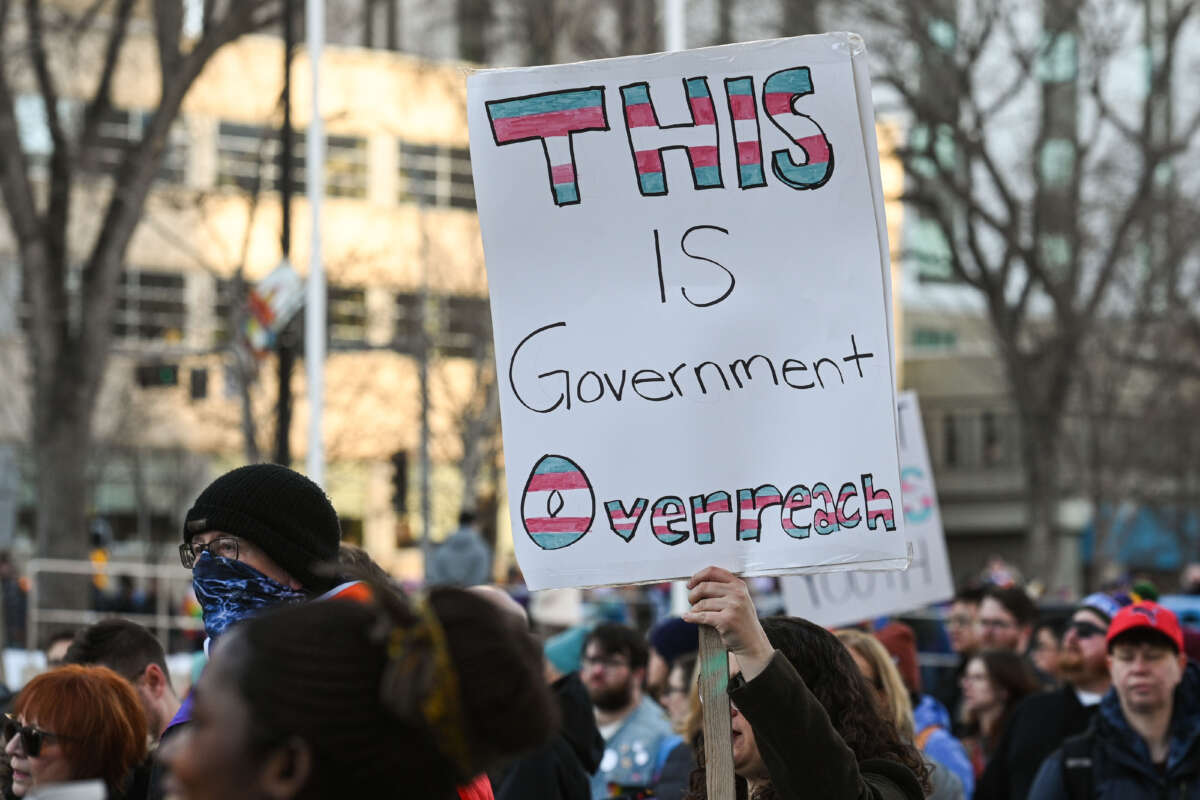Did you know that Truthout is a nonprofit and independently funded by readers like you? If you value what we do, please support our work with a donation.
A new bill at the Missouri House would criminalize teachers who validate a transgender child’s gender by utilizing their chosen names and pronouns.
“A teacher in Missouri could be charged with a felony and put on the sex offender registry for using they/them pronouns for a student. This is insane,” civil rights attorney Alejandra Caraballo said on social media.
Those found guilty under House Bill 2885 would be subject to a $10,000 fine, imprisonment, and placement on the state’s sexual offender registry as a Tier 1 sex offender. Given that sex offenders in Missouri are not allowed to reside within 500 feet of a school or daycare, the bill would essentially end the teacher’s career.
“Missouri has introduced a bill that would charge a teacher with a FELONY and put them on the SEX OFFENDER registry if they used a student’s preferred pronouns,” LGBTQ legislative researcher Allison Chapman wrote on social media. “This is fascism.”
House Bill 2885, sponsored by Jamie Gragg (R), proposes making it a Class E felony for teachers or school counselors to assist in the “social transition” of a transgender child. The bill defines “social transition” as “the process by which an individual adopts the name, pronouns, and gender expression, such as clothing or haircuts, that match the individual’s gender identity and not the gender assumed by the individual’s sex at birth.”
“A new bill in Missouri would put teachers on the sex offense registry if they ‘contribute to social transition’ of a trans youth. Including pronouns, haircuts, information, and more,” transgender activist and journalist Erin Reed wrote on social media. “It would make a teacher ‘contributing to social transition’ a class E felony.”
Gragg is also sponsoring other bills targeting LGBTQ people, including a bill that would prevent the state librarian from allocating funds to libraries that provide what is deemed “obscene” material to children. LGBTQ advocates have argued that bills like this are a form of censorship targeting LGBTQ content.
Missouri is currently rated by Reed as a “high-risk” state for transgender youth. However, the state may soon join Kansas, Montana, Oklahoma, North Dakota, Tennessee, and Utah in becoming one of the “worst states” for transgender youth due to the introduction of more than 35 anti-LGBTQ bills by Missouri lawmakers this legislative session.
“I honestly don’t believe something like this could pass, even in Missouri, but it’s worth noting as it’s rare we get ‘new’ anti-trans bills that haven’t been written before,” Reed said. “And in a much more fascist, right wing, anti-trans government, should they win, it wouldn’t surprise me.”
Creating a supportive school environment is essential for decreasing the risk of suicide among LGBTQ youth. “It has been repeatedly shown in studies that having a supportive environment reduces the risk of suicide in trans and queer youth,” Chapman told Truthout.
In fact, a 2023 survey conducted by The Trevor Project found that 41 percent of LGBTQ youth had seriously contemplated suicide in the previous year, with transgender and nonbinary youth and/or youth of color reporting even higher rates. While only half of transgender and nonbinary youth surveyed identified their school as supportive of their gender identity, those who did reported fewer suicide attempts.
Furthermore, the survey found that anti-LGBTQ policies and legislation, like House Bill 2885, pose a significant threat to LGBTQ youth. Almost one-third of LGBTQ youth reported consistently poor mental health due to such policies and legislation, and nearly two-thirds stated that the prospect of state or local laws prohibiting discussions about LGBTQ people in schools significantly worsened their mental wellbeing.
In February, Nex Benedict, a 16-year-old transgender student of Choctaw Nation descent, was attacked by three students in the girls’ restroom at Owasso High School in Owasso, Oklahoma, and succumbed to the injuries sustained the next day. Advocates have emphasized that Benedict’s tragic death underscores the grave repercussions of anti-LGBTQ politicians and their policies.
“Missouri’s attempt to criminalize teachers who attempt to foster a safe and inclusive environment not only makes the environment unsupportive, it makes it downright hostile,” Chapman told Truthout. “This hostility leads to violence, bullying, and as the death of Nex Benedict recently showed us, murder.”
A terrifying moment. We appeal for your support.
In the last weeks, we have witnessed an authoritarian assault on communities in Minnesota and across the nation.
The need for truthful, grassroots reporting is urgent at this cataclysmic historical moment. Yet, Trump-aligned billionaires and other allies have taken over many legacy media outlets — the culmination of a decades-long campaign to place control of the narrative into the hands of the political right.
We refuse to let Trump’s blatant propaganda machine go unchecked. Untethered to corporate ownership or advertisers, Truthout remains fearless in our reporting and our determination to use journalism as a tool for justice.
But we need your help just to fund our basic expenses. Over 80 percent of Truthout’s funding comes from small individual donations from our community of readers, and over a third of our total budget is supported by recurring monthly donors.
Truthout has launched a fundraiser to add 379 new monthly donors in the next 6 days. Whether you can make a small monthly donation or a larger one-time gift, Truthout only works with your support.
